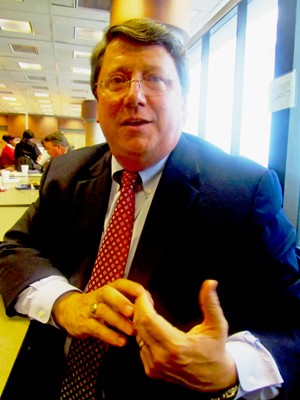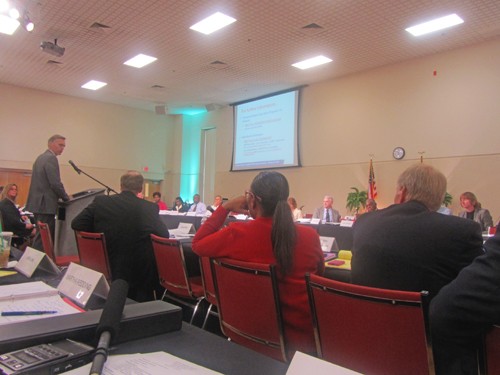To vary an old metaphor, a week of big bangs on the school-merger front has ended, not with a whimper (to suggest so would be both inaccurate and discourteous) but with — oh, with whispery vacillation on the part of the contending parties.
Mark Norris, the Collierville Republican who is state Senate Majority Leader and has legislative authority second only to that of Senate Speaker/Lieutenant Governor Ron Ramsey, was essentially biding his time on Friday, following a surprise rebuff in the House to legislation of his on behalf of municipal school districts for Shelby County.
Meanwhile, the Unified School Board of Shelby County, taking up on Thursday night an emergency agreement between itself and the Shelby County Commission on disposition of county school property, deadlocked unexpectedly 9-9, forgoing a chance to arm itself with a legal weapon against further power moves from Nashville.

- JB
- Norris in Nashville on Thursday
In an interview on Thursday after the close of the legislative week, Norris pointed out this year’s session of the General Assembly was hastening toward an end and sounded hesitant to press forward with a bill (SB2908, HB3234) that was “rolled” (postponed) in a House subcommittee Wednesday.
The bill, which Norris himself had guided effortlessly through a Senate committee the week before, would jump up the date for legally creating new municipal school districts from August 2013 , the time specified in the 2011 Norris-Todd bill, to January 1, 2013, and would apply the action — technically, the removal of a 20-year ban on new municipal districts — statewide. The later deadline in the 2011 bill by Norris and state Rep. Curry Todd (R-Collierville) has applied only to new municipal districts in Shelby County.
The new bill is co-sponsored , more formally than otherwise, by GOP House Majority Leader Gerald McCormick of Chattanooga, who, when he presented the measure in a House education subcommittee on Wednesday, was either reluctant concerning the bill or uncertain of its import, or likely both.
McCormick’s uneasy presentation (he seemed to think the bill was an amendment, not self-contained legislation) was quickly followed by denunciations from former longtime House Speaker Jimmy Naifeh (D-Covington), who, in an impassioned broadside, branded it a “segregation” measure to create “white school districts” in the Shelby County suburbs, and from Rep. Lois DeBerry (D-Memphis), who demanded that it be rolled so as to help salvage a school environment in Shelby County that was “in [dis]-array.”
Given that even Bill Dunn of Knoxville, a ranking Republican, also expressed misgivings about the bill (without specifying them), it was indeed rolled.
All of this took place in the immediate aftermath of Tuesday’s bombshell opinion from state Attorney General Robert Cooper that five Shelby Country municipalities (Germantown, Collierville, Bartlett, Lakeland, and Arlington) were not entitled, under the terms of Norris-Todd, to proceed with scheduled May 10 referenda to authorize municipal school systems for their communities.
Not until the city/county school merger itself was concluded on the pre-ordained August 2013 date would the municipalities be eligible to create new school systems or to carry out any enabling measures, such as holding referenda. “Each of these activities would require an action by an already-established school system,” reads the opinion, binding the municipalities in a virtual Catch-22. After consulting with state election authorities, the Shelby County Election Commission dutifully voted to cancel the May 10 referenda at a Wednesday afternoon meeting that was more or less simultaneous with the House subcommittee’s action forestalling the new Norris bill.
Under the shadow of all these circumstances, Norris not only expressed uncertainty in his Thursday interview about renewing SB2908/HB3234, he downplayed the prospect of putting forth explicit legislation of any other kind regarding the Shelby County school situation.(In their respective end-of-week press availabilities, Democratic House leaders Mike Turner and Craig Fitzhugh condemned the rolled bill as yet another instance of Republicans trying to steamroller local options, while Republican leaders Beth Harwell and Debra Maggart continued to stand behind the bill.)
A seemingly chastened Norris went so far as to suggest that Shelby County’s suburban mayors should reconsider a unification formula, entitled “Multiple Achievement Paths,” which the Transition Planning Commission on city/county school merger had endorsed but which the mayors had rejected. The formula allows extensive autonomy for suburban schools but not their outright independence. “As long as they are allowed to have their own districts,” Norris said, these districts could find a place under a common umbrella like the one proposed.
Norris said further that such an arrangement would circumvent the currently ticklish problem of how — and at what cost, if any —new suburban school districts could acquire existing school properties.
When 18 of the 23 members of the interim Unified School Board of Shelby County gathered for a specially called meeting Thursday night, they were expected to affirm a proposed legal agreement in which Shelby County government would confer on the Board de facto title and full fiduciary responsibility for school properties, as well as authority to exact value and apply the proceeds resulting from any transfer of the properties.
In voting on the proposal, the Board, composed of the 9 former members of the Memphis City Schools board and the 7 former members of the Shelby County Schools board, plus 7 new members who had been appointed by the Shelby County Commission, cleaved generally along city/county lines, but, in something of a surprise, a majority of the new members voted against the agreement, which failed on a 9-9 vote.
It remains to be seen whether this action gives Norris new incentive to push binding legislation or whether it confirms the hopes of those swing Board members who argued that rejecting the agreement would clear the way for fair-minded negotiations on the future of county school properties.
Meanwhile, the Unified School Board was scheduled to review its vote on the agreement at its forthcoming Tuesday night meeting, and the mayors of Shelby County’s five suburban municipalities indicated they might seek a legal injunction to force the Election Commission to proceed with the now canceled May 10 referenda in their communities.
All but lost in the shuffle was TPC member David Pickler’s recent proposal that all parties agree to seek a year’s extension of the merger timetable — something that would require the approval of U.S. Disttrict Judge Hardy Mays, who has jurisdiction over the increasingly tangled situation. At the conclusion of a Transition Planning Commission meeting that immediately preceded the Unified Board’s meeting Thursday night, TPC chair Barbara Prescott announced that sentiment on the group’s executive committee was to reject the Pickler proposal but that it would be discussed at next week’s TPC meeting.

- JB
- Nashville school authority Chris Henson addresses members of TPC and Unified School Board on Thursday night